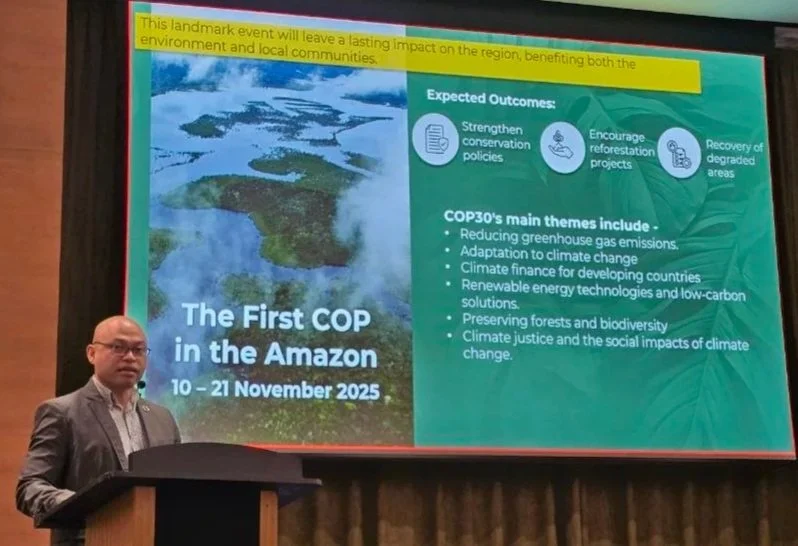Malaysia Pavilion’s COP30 Focus Group Discussions Conclude with Unified Agenda
Kuala Lumpur, 17 September 2025 — The COP30 Focus Group Discussions (FGDs) for the Malaysia Pavilion, arranged by the Malaysian Green Technology and Climate Change Corporation (MGTC) with support from PEMANDU Associates, concluded yesterday with a cross-syndication plenary that consolidated inputs from across government, finance, industry, academia, and civil society ahead of COP30 in Belém, Brazil.
Planters International Berhad (PIB) attended and contributed to all thematic FGDs, sharing perspectives on forest restoration, digital monitoring, river–coastal rehabilitation, and climate finance pathways.
Thematic Highlights
Restoring Our Rainforests, Rivers & Reefs
Spotlight initiatives included:Forest Conservation Certificate (FCC) and Forest Carbon Offset (FCO) by Malaysia Forest Fund, shaping Malaysia’s future conservation finance mechanisms.
Tropical Rainforest Living Collection (TRLC) and Seed to Tree Project (STT) by TRCRC, conserving rare dipterocarp species and engaging indigenous communities in reforestation.
Community-based Mangrove Restoration at Tanjung Kepah by Yayasan Hasanah and Wetlands International, where permeable wave screens and enrichment planting are building local resilience.
Cetacean Protection Programme by MareCet and Yayasan Hasanah, piloting “pingers” with fishers to reduce marine mammal bycatch.
Omadal Seaweed Cultivation & Bajau Laut Empowerment, integrating livelihood opportunities with health and cultural resilience.
PIB added perspectives from its Enrichment & Reforestation Programme in Kelantan and its Coastal Oasis – Sungai Klang & Coastal Islands Programme, integrating restoration with circular economy and digital MRV backed by AFAM.
Energy Transition Pathways for Developing Nations
Core initiatives discussed included:ASEAN Power Grid (APG), with TNB and ASEAN partners targeting enhanced interconnection and renewable trade.
NETR flagship projects such as hydrogen hubs, solar parks, and co-firing pilots by PETRONAS and TNB.
Sustainable Procurement Code of Conduct (SPCC) by TNB, embedding ESG into supply chains.
Community Energy Storage System (CESS) pilot at Elmina Ilham, showcasing household-level clean energy and savings.
PIB highlighted the role of biochar and waste-to-energy systems in bridging forestry and energy transition agendas.
Climate Justice in the Global South
Key initiatives spotlighted:Royal Belum Biodiversity Protection and Education, where Orang Asli youth act as forest patrollers and women as literacy educators.
Global Indigenous Youth Summit on Climate Change (GIYSCC), positioning youth as leaders in stewardship.
Nature Education with Youth (Kelab Pencinta Alam) by MNS, engaging over 16,000 students nationwide.
Community literacy and capacity programmes linking environmental justice to socioeconomic empowerment.
PIB reinforced the importance of indigenous and local community inclusion in both forest and coastal projects.
Future-Proofing Water, Food Systems & Industry
Initiatives covered a wide spectrum:PANACEA Project by Universiti Malaya and partners, co-developing nature-based adaptation options with coastal communities in Sabah.
Fisheries Climate Impact Study by Department of Fisheries Malaysia and UM, mapping resilience strategies for small-scale fishers.
Blue School / Ocean Literacy Project by UMT and ALAM, embedding ocean literacy in national education frameworks.
Eco School & Green Flag programme, rewarding schools for sustainability leadership.
Waste interception and recycling hubs in Sungai Pinang, co-developed with LLSB, demonstrating public–private collaboration.
PIB shared how its Active Forest Asset Management (AFAM) platform can extend MRV into water–food–industry resilience planning.
Unlocking Finance for Net-Zero
Financial leaders including Bank Negara Malaysia, Securities Commission, Khazanah, PNB, CIMB, Maybank, HSBC, and Bursa Malaysia explored pathways such as:Green and Blue Sukuk for conservation and resilience financing.
ESG-linked financial products to align conservation outcomes with capital markets.
JC3’s Climate Finance Innovation Lab (CFIL), driving innovations in financing instruments through collaboration between Bank Negara Malaysia and the Securities Commission.
Malaysia Forest Fund mandates to diversify biodiversity conservation funding sources.
PIB positioned its Coastal Oasis and AFAM initiatives as strong candidates for blended finance and ESG-linked instruments.
Broad Participation
The FGDs convened a wide coalition of stakeholders:
Government & Regulators: NRES, PETRA, Ministry of Finance, Ministry of Economy, Sarawak & Sabah Forestry, JPSM, MOT, KPKT.
Financial Institutions: Bank Negara Malaysia, Securities Commission, Khazanah, Maybank, CIMB, RHB, PNB, HSBC.
Civil Society & Academia: Yayasan Hasanah, TRCRC, WWF Malaysia, MNS, Wetlands International, Universiti Malaya, UMT, ALAM.
Private Sector & Industry: Planters International Berhad, PETRONAS, TNB, Sime Darby, Nestlé Malaysia, Yinson Holdings, Worldwide Holdings, 99 Speed Mart.
Closing Plenary
The FGDs concluded with the Cross-Syndication & Closing Plenary, officiated by Datuk Nor Yahati binti Awang, Deputy Secretary-General (Environmental Sustainability), Ministry of Natural Resources and Environmental Sustainability (NRES).
Datuk Nor Yahati binti Awang, Deputy Secretary-General (Environmental Sustainability), Ministry of Natural Resources and Environmental Sustainability (NRES)
Towards COP30
With MGTC’s leadership and PEMANDU’s facilitation, the FGDs have produced a unified, cross-sector agenda for COP30.
Planters International Berhad’s contributions across all sessions ensured that reforestation, coastal ecosystem recovery, digital MRV, and circular economy approaches were embedded in Malaysia’s broader narrative — complementing a diverse range of national and partner initiatives that will be showcased in Belém.









